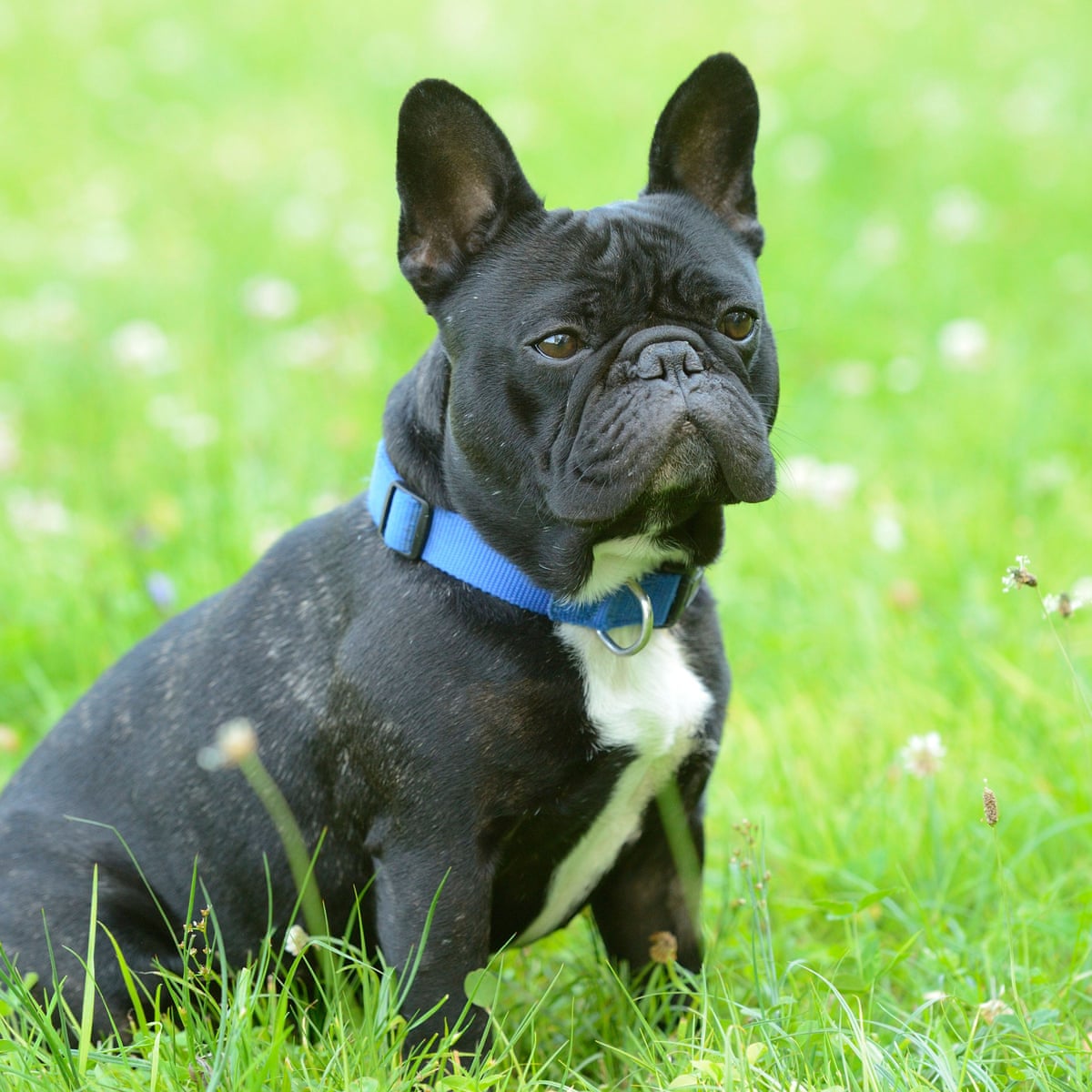French Bulldogs are a brachycephalic breed with health concerns related to their short face and smaller nose, making breathing difficult. They have a low tolerance for heat, humidity, and too much exercise.
Being aware of these factors is essential when caring for a French bulldog (Frenchie Facts). French Bulldogs may also have fears, such as those of cyclists, bikers, and skateboarders, which should be addressed and resolved as early as possible to prevent aggression (TomKings Kennel).
Additionally, common health issues for French Bulldogs include Brachycephalic Obstructive Airway Syndrome (BOAS), heat stroke, eye issues, skin fold dermatitis, and hip and elbow dysplasia (Forbes). They should also avoid certain foods like garlic, onions, grapes, raisins, cherries, and chocolate (Raised Right Pets).

Understanding French Bulldogs
French Bulldogs, also known as Frenchies, are an adorable and popular breed known for their distinctive appearance and charming personalities. However, it’s essential to understand certain aspects of French Bulldogs to provide them with the best care and avoid unnecessary discomfort. In this article, we will delve into the facts every Frenchie owner should know, ranging from their brachycephalic breed characteristics to common health concerns and fears they may have.
Brachycephalic Breed
French Bulldogs fall under the category of brachycephalic dog breeds. This means they have a short-nosed and flat-faced structure, affecting their breathing and overall health. The unique anatomy of their face and smaller nose can make breathing challenging and less efficient than that of other breeds. Due to this, French Bulldogs have a low tolerance for heat, humidity, and excessive exercise. It’s crucial to be mindful of their respiratory limitations and take appropriate precautions to ensure their well-being.
Health Concerns
The brachycephalic structure of French Bulldogs makes them prone to various health concerns. Awareness of these issues is essential to providing care and keeping them healthy. Some common health concerns among French Bulldogs include:
- Brachycephalic Obstructive Airway Syndrome (BOAS): This syndrome can lead to airway obstruction, causing difficulty breathing and potentially respiratory distress.
- Heat Stroke: French Bulldogs are highly susceptible to heat stroke due to their inability to regulate body temperature efficiently. It’s essential to keep them cool and hydrated.
- Eye Issues: Dry eye, cherry eye, entropion, and corneal ulcers are common eye problems in French Bulldogs. Regular vet check-ups and proper eye care are crucial.
- Skin fold dermatitis and skin infections: The skin folds of French Bulldogs can accumulate moisture and bacteria, leading to skin irritations and infections. Regular cleaning and proper grooming are necessary.
- Hip and Elbow Dysplasia: French Bulldogs can be prone to hip and elbow dysplasia, which can cause mobility issues. Regular exercise and a healthy diet can help manage these conditions.
- Ear Infections and Deafness: Their adorable floppy ears can trap moisture and debris, making them prone to ear infections. Regular cleaning and preventive measures can help prevent infections and deafness.
Common Fears
Like any other dog breed, French bulldogs can develop common fears and anxieties. Understanding and addressing these fears is essential to ensuring their emotional wellbeing. Some common concerns among French bulldogs include:
- Fear of cyclists, bikers, and skateboarders: It’s essential to help them overcome these fears early on to prevent adverse behavioral outcomes, such as aggression.
- Fear of loud noises: French bulldogs may be sensitive to loud noises like fireworks or thunderstorms. Providing a safe and calm environment during such events can help alleviate their anxiety.
- Separation anxiety: French bulldogs are known for their loyalty and attachment to their owners. They may experience separation anxiety when left alone for extended periods. Gradual training and positive reinforcement techniques can help them cope with this fear.
By understanding the brachycephalic nature of French Bulldogs, their specific health concerns, and everyday fears, you can provide them with the best possible care and ensure they live a happy and healthy life.
:max_bytes(150000):strip_icc()/Boston-Terrier-vs-French-Bulldog-2-2000-a518d758b3fd4492b6b2867032a4c4f6.jpg)
Care And Health Tips
French bulldogs are adorable and lovable companions, but they require special care and attention regarding their health. As a responsible Frenchie owner, you must know common health issues, their recommended diet, foods to avoid, and things never to do. By following these care and health tips, you’ll ensure that your Frenchie stays happy and healthy.
Common Health Issues
Like any other breed, French bulldogs are susceptible to specific health issues. Knowing these common health concerns is essential to provide the best possible care for your Frenchie.
- Brachycephalic Obstructive Airway Syndrome (BOAS): French Bulldogs have short faces and smaller noses, making it difficult for them to breathe efficiently. This can lead to respiratory problems, exercise intolerance, and overheating.
- Heat Stroke: Due to their brachycephalic nature, French Bulldogs have a low tolerance for heat and humidity. Keeping them cool and avoiding exposure to extreme temperatures is crucial.
- Eye Issues: Frenchies are prone to various eye problems, such as dry eye, cherry eye, entropion, and corneal ulcers. Regular eye care and check-ups are necessary to maintain their ocular health.
- Skin Fold Dermatitis and Infections: Their adorable wrinkles can create a breeding ground for bacteria and yeast, leading to skin fold dermatitis and infections. Regular cleaning and drying of their skin folds are essential to preventing these issues.
- Hip and Elbow Dysplasia: Like many other breeds, French Bulldogs can develop hip and elbow dysplasia, which affects their joint health. Regular exercise and a balanced diet can help maintain joint health and prevent these conditions.
- Ear Infections and Deafness: French Bulldogs are prone to ear infections due to their floppy ears and narrow ear canals. Regular ear cleaning and proper hygiene can help prevent these infections and associated deafness.
Recommended Diet
A nutritious and balanced diet is crucial for your French Bulldog’s health and wellbeing. Providing them with high-quality, protein-rich food that meets their dietary needs is essential.
Here are some tips to consider while choosing the best diet for your Frenchie:
- Opt for high-quality, grain-free, and human-grade pet food to ensure they receive optimal nutrition.
- Consult with your veterinarian to determine the right portion size and feeding schedule based on your Frenchie’s age, weight, and activity level.
- Consider feeding them smaller, more frequent meals daily to prevent bloating and aid digestion.
- PAlways provide fresh water and avoid feeding your Frenchie table scraps or excessive treats that can cause weight gain and lead to health issues.
Avoidance Of Certain Foods
While some foods are safe for humans, they can be toxic or harmful to French bulldogs. It’s crucial to avoid feeding your Frenchie certain foods to protect their health and wellbeing.
| Foods to Avoid |
|---|
| Garlic |
| Onions |
| Grapes |
| Raisins |
| Cherries |
| Chocolate |
These foods can be toxic to your Frenchie and cause various health issues. If you suspect that your Frenchie has ingested any of these foods and exhibits symptoms such as vomiting, diarrhea, or weakness, seek immediate veterinary assistance.
Things To Never Do
As a loving owner, it’s essential to be mindful of specific things you should never do regarding your Frenchie’s care and health.
- Never leave your Frenchie in a hot or humid environment for an extended period, as it can lead to heatstroke and respiratory distress.
- Avoid exposing your Frenchie to extreme temperatures, such as by leaving them outside on a scorching or freezing day.
- Never ignore signs of distress or discomfort in your Frenchie. If they exhibit difficulty breathing, excessive panting, or unusual behaviors, seek veterinary attention promptly.
- Avoid using harsh chemicals or cleaning products on surfaces your Frenchie frequently encounters.
- Never force your Frenchie to engage in excessive or strenuous exercise, as their brachycephalic nature makes them prone to respiratory issues.
By following these care and health tips, you’ll ensure that your French Bulldog leads a happy, healthy, and fulfilling life by your side.

Frequently Asked Questions For 17 Things To Never Say To A French Bulldog | Frenchie Facts
What They Don T Tell You About French Bulldogs?
French Bulldogs have health concerns due to their short faces and smaller noses, which make breathing difficult. They also have a low tolerance for heat, humidity, and excessive exercise. It is essential to know these factors when owning a French Bulldog.
What Are Frenchies Scared Of?
Frenchies are often scared of cyclists, bikers, and skateboarders. It is essential to address these fears early to prevent aggression later on.
What Bothers French Bulldogs?
French Bulldogs can be bothered by health issues related to their short-nosed breed, such as breathing difficulties and heat intolerance. They should also avoid certain foods like garlic, onions, grapes, raisins, cherries, and chocolate. Additionally, they may have fears of cyclists, bikers, and skateboarders, which should be addressed early to prevent aggression.
What Should French Bulldogs Stay Away From?
French bulldogs should stay away from preservatives and fillers in their food. They should also avoid garlic, onions, grapes, raisins, cherries, and chocolate. It’s essential to provide them with a healthy and balanced diet.
Conclusion
French Bulldogs are incredible companions, but there are certain things we should never say to them. Remember, their short-nosed breed makes breathing difficult, so be mindful of their tolerance to heat and exercise. Avoid negative comments about their appearance, intelligence, or any potential insecurities.
Instead, show them love, care, and understanding. We can ensure a happy and healthy relationship with these adorable pups by treating our Frenchies with the respect and kindness they deserve.

